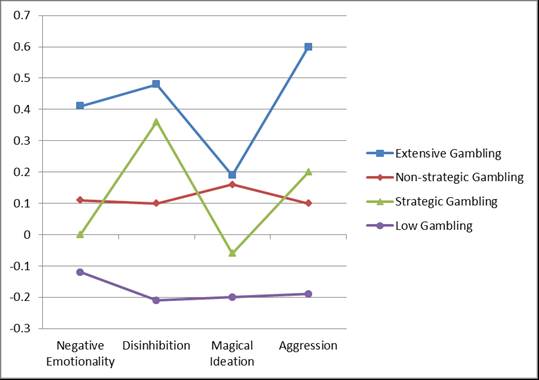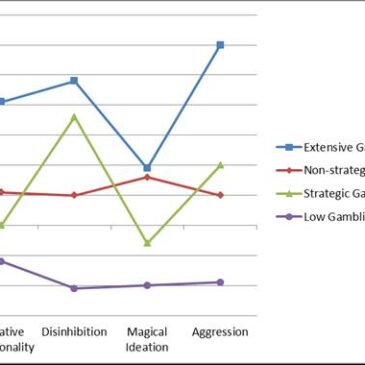Researchers have suggested that personality might be involved in shaping gambling behaviors (McDaniel & Zuckerman, 2003; Mowen et al., 2009). For example, sensation-seeking and impulsivity are associated with excessive gambling (McDaniel & Zuckerman, 2003). What is less clear is the relationship between specific personality traits and specific types of gambling activities, such as slot machines, online gambling, or sports betting. In this week’s edition of The WAGER, we review a study that examined associations between personality traits and gambling activity choices (Savage, Slutske, & Martin, 2014).
Methods
- The researchers analyzed data from a sample of 4,669 Australian individuals (mean age= 37.7 years, 57.2% female) who participated in a study of gambling behaviors and personality differences (Slutske et al., 2009). The participation rate was 80.4%.
- Data included information related to individuals’ participation in 10 different kinds of gambling behaviors during the past year (e.g., (slot) machines (EGMs), horse/dog races, table games such as bingo, sports betting, and game of skill such as billiards).
- Data also included participants’ responses to scales measuring personality characteristics, behavioral control, and magical ideation (i.e., beliefs about superstition, horoscopes, lucky charms, and magic numbers).†
- The researchers performed a latent class analysis to classify participants by gambling activity choices, and then used regression techniques to examine how the classes varied by personality traits. We report upon emotionality (positive vs negative), behavioral control (high vs low), aggression, and magical ideation (high vs low) among key latent classes.
Results
- Based on the results of the latent class analysis, researchers split the sample into five classes based on gambling activity.
- Class 1: Extensive Gambling (7.1% of the sample; more likely to engage in every gambling activity than the other groups)
- Class 2: Non-strategic Gambling (20.8%; highest participation in lottery and scratch card games, electronic machine gaming, keno, and bingo)
- Class 3: Strategic Gambling (11.6%; horse and dog races, table games, sports betting, cards and games of skill)
- Class 4: Lottery/scratch card (38.1%)
- Class 5: Low Gambling (22.5%)
- Classes 1-3 differed from Class 5 on negative emotionality, disinhibition, aggression, and magical ideation. These Classes differed from each other, as shown in the Figure:
- Unadjusted analyses showed the Extensive Gambling class had relatively high negative emotionality, high disinhibition, high aggression and high levels of magical ideation.
- Unadjusted analyses showed the Non-Strategic Gambling class (Group 2) had relatively high negative emotionality, average disinhibition, high aggression, and high levels of magical ideation.
- Unadjusted analyses showed the Strategic Gambling class (Group 3) had relatively low negative emotionality, high disinhibition, high aggression, and low levels of magical ideation.

Figure. Standardized z-scores on personality characteristics across three classes of gambling. Click image to enlarge.
Limitations
- The results of this study are not necessarily generalizable to other populations. There could be different patterns of gambling activities in other countries. In a previous study, the researchers found a class of card gamblers in a study population in the United States which they did not find in the present study in Australia (Slutske et al, 2009).
Conclusion
The results of this study suggest that game preferences relate to specific personality characteristics. If this is the case, specialists could design specific interventions targeted towards personality types. For example, in this sample, individuals in the extensive gambling group showed high negative emotionality, low behavioral control, high aggression and high levels of magical ideation. An intervention specifically targeted those distinct patterns of personality traits could help reduce risk for gambling problems in this group of people.
– Kat Belkin
References
Eckblad, M., & Chapman, L. J. (1983). Magical ideation as an indicator of schizotypy. Journal of Consulting and Clinical Psychology, 51, 215-225.
McDaniel, S. R., & Zuckerman, M. (2003). The relationship of impulsive sensation seeking and gender to interest and participation in gambling activities. Personality and Individual Differences, 35, 1385-1400.
Mowen, J. C., Fang, X., & Scott, K. (2009). A hierarchical model approach for identifying the trait antecedents of general gambling propensity and of four gambling-related genres. Journal of Business Research, 62, 1262-1268.
Slutske, W. S., Meier, M. H., Zhu, G., Statham, D. J., Blaszczynski, A., & Martin, N. G. (2009). The Australian twin study of gambling (OZGAM): Rationale, sample description, predictors of participation, and a first look at sources of individual differences in gambling involvement. Twin Research and Human Genetics, 12, 63-78.
Tellegen, A., & Waller, N. G. (2008). Exploring personality through test construction: Development of the Multidimensional Personality Questionnaire. In G. J. Boyle, G. Matthews, & D. H. Saklofske (Eds.), The SAGE handbook of personality theory and assessment, Vol. 2: Personality measurement and testing, (pp. 261–292). Thousand Oaks, CA: Sage.
Zuckerman, M. (1971). Dimensions of sensation seeking. Journal of Consulting and Clinical Psychology, 36, 45-52.
† Data also included participants’ responses to several different personality scales:
- The Multidimensional Personality Questionnaire (MPQ; Tellegen & Waller, 2008). assessed positive and negative emotionality.
- The Sensation Seeking Scale (SSS; Zuckerman, 1971) assessed levels of behavioral control.
- The Magical Ideation Scale (MIS; Eckblad & Chapman, 1983) assessed superstition and beliefs in horoscopes, lucky charms and magic numbers.




